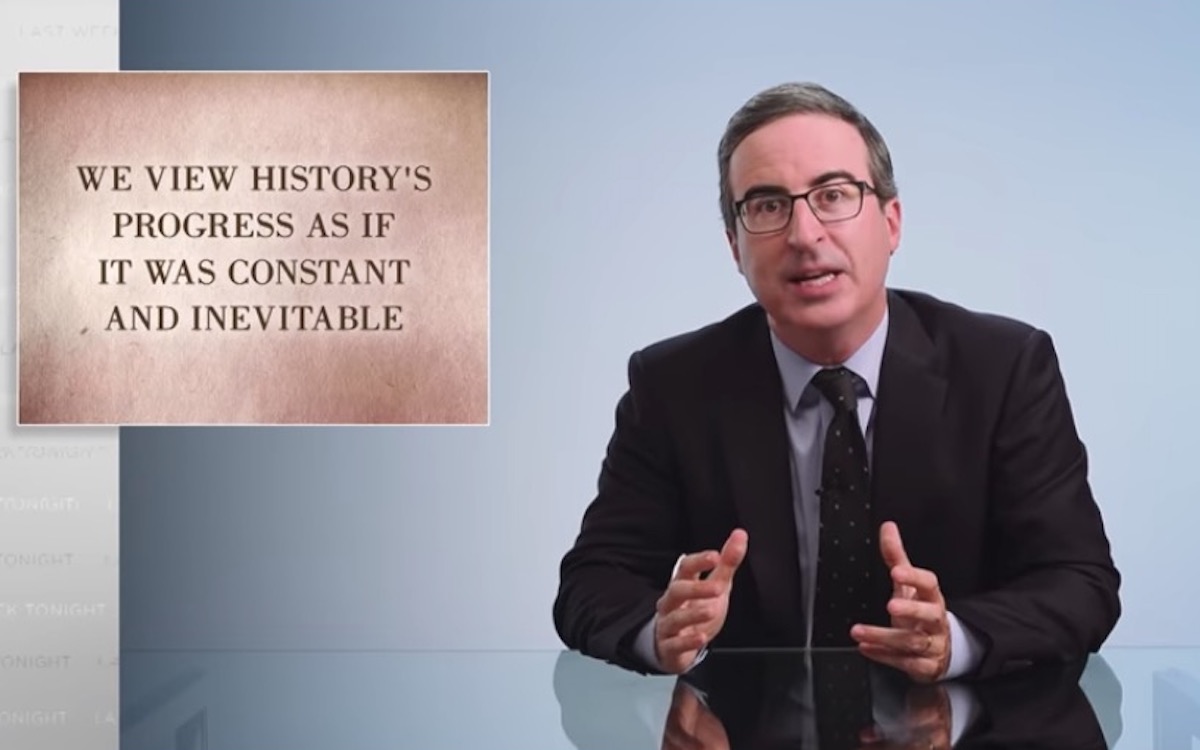On Last Week Tonight, John Oliver Deep-Dives Into America’s Refusal to View Our Own History Accurately

On Last Week Tonight, John Oliver typically does a deep dive into a topical issue, usually one that is currently unfolding or relevantly recent. In the latest episode, Oliver takes aim at the very concept of American history–or rather, the terrible ways in which we as Americans choose to remember that history.
Oliver began with the ways in which America has erased crucial parts of its Black history, starting with Juneteenth or the Tulsa massacre, which most white Americans had to learn about from HBO’s Watchmen series just this year.
Beyond the straight-up erasure, Americans have an awful habit of viewing our history through rose-colored glasses. We insist on ascribing a happy ending to systemic tragedies and, possibly even worse, an endpoint. We view injustice as having an inherent arc toward rectification, as if–as Oliver lays out–there was a natural progression from slavery to the Civil War ending slavery, to the Civil Rights Movement to an end to racism. “Just a smooth, steady, upward arc,” Oliver says, describing a view that ignores a lot of things, including “white hostility and ugly backsliding.”
Ignoring that ugliness is how we get people like Senator Tom Cotton calling slavery a “necessary evil” and falsely insisting that the founding fathers always intended for the institution to be eradicated. It’s why so many people think of the Civil Rights Movement as existing basically entirely between Rosa Parks peacefully sitting on a bus and Martin Luther King, Jr. peacefully giving one great speech.
It’s how you get people like the man shown in this episode claiming we should look on the “positive” side of slavery and celebrate how we as a country “overcame” it without acknowledging that “we” didn’t overcome anything. Some Americans fought and died to convince the rest of the country to give up their known way of life and legal sense of racial superiority.
But, as Oliver puts it, “The less you know about history, the easier that it is to imagine you’d always be on the right side of it.”
“History, when taught well, shows us how to improve the world,” he says. “But history, when taught poorly, falsely claims there is nothing to improve.”
It’s also worth noting that Oliver’s overwhelmingly white writers room just added two new Black writers: Ali Barthwell and Greg Iwinski. The show, which I already loved dearly, is already better because of them.
EVERYONE WATCH LAST WEEK TONIGHT WITH JOHN OLIVER AT 10PM CT BECAUSE I WROTE SOME OF IT!!! CAN YOU BELIEVE IT?
WHAT A DAY! WHAT A TREAT! WHAT A THRILL!!
— Ali B (@wtflanksteak) August 2, 2020
(image: screenshot)
Want more stories like this? Become a subscriber and support the site!
—The Mary Sue has a strict comment policy that forbids, but is not limited to, personal insults toward anyone, hate speech, and trolling.—
Have a tip we should know? [email protected]
